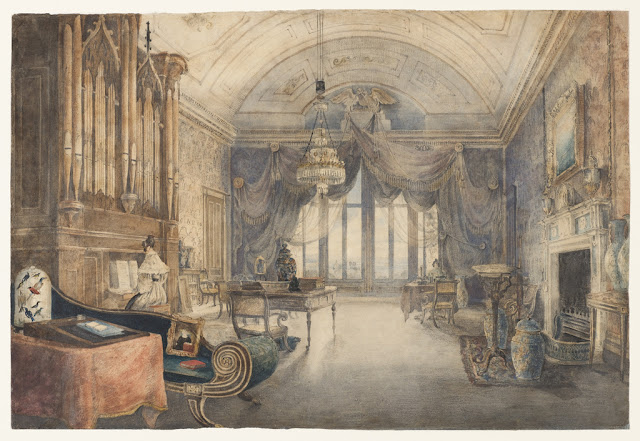 |
| Augustus Charles Pugin Library at Cassiobury before 1816 watercolor Cooper Hewitt, Smithsonian Design Museum |
 |
| William Henry Hunt Green Drawing Room of the Earl of Essex at Cassiobury 1823 watercolor, gouache Cooper Hewitt, Smithsonian Design Museum |
 |
| Anonymous English artist Large Salon with Organ 1830 watercolor, gouache Cooper Hewitt, Smithsonian Design Museum |
 |
| William Alfred Delamotte Drawing Room at Middleton Park, Oxfordshire 1839 watercolor Cooper Hewitt, Smithsonian Design Museum |
 |
| William Alfred Delamotte Drawing Room looking toward Conservatory, Middleton Park, Oxfordshire 1840 watercolor gouache Cooper Hewitt, Smithsonian Design Museum |
 |
| Anonymous English artist Drawing Room ca. 1842 watercolor, gouache Cooper Hewitt, Smithsonian Design Museum |
"Mr. Harding had ever mixed something of fear with his warm affection for his elder son-in-law, and now in these closing hours of his life he could not avoid a certain amount of shrinking from that loud voice – a certain inaptitude to be quite at his ease in that commanding presence. The dean, his second son-in-law, had been a modern friend in comparison with the archdeacon: but the dean was more gentle with him: and then the dean's wife had ever been the dearest to him of human beings. It may be a doubt whether one of the dean's children was not now almost more dear, and whether in these days he did not have more free communication with that little girl than with any other human being. Her name was Susan, but he had always called her Posy, having himself invented for her that soubriquet. . . . Posy was now five years old, and could talk well, and had her own ideas of things. Posy's eyes, – hers, and no other besides her own, – were allowed to see the inhabitant of the big black case [a cello]; and now that the deanery was so nearly deserted, Posy's fingers had touched the strings, and had produced an infantine moan. 'Grandpa, let me do it again.' Twang! It was not, however, in truth, a twang, but a sound as of a prolonged dull, almost deadly, hum-m-m-m-m! On this occasion the moan was not entirely infantine, – Posy's fingers have been something too strong, – and the case was closed and locked, and grandpa shook his head.
'But Mrs. Baxter won't be angry,' said Posy. Mrs. Baxter was the housekeeper in the deanery, and had Mr. Harding under her especial charge.
'No, my darling; Mrs. Baxter will not be angry, but we mustn't disturb the house.'
'No,' said Posy, with much of important awe in her tone; 'we mustn't disturb the house; must we, grandpapa?' And so she gave in her adhesion to the closing of the case. But Posy could play cat's-cradle, and as cat's-cradle did not disturb the house at all, there was a good deal of cat's-cradle played in these days. Posy's fingers were soft and pretty, so small and deft, that the dear old man delighted in taking the strings from them, and in having them taken from his own by those tender little digits."
– Anthony Trollope, from The Last Chronicle of Barset (1867)
 |
| Charles James Richardson Entrance Hall, East Sutton Place, Kent 1844 watercolor Cooper Hewitt, Smithsonian Design Museum |
 |
| Charles James Richardson Library in Gothic Style ca. 1860 watercolor Cooper Hewitt, Smithsonian Design Museum |
 |
| Joseph Nash the Elder Elizabethan Room at Lyme Hall, Cheshire 1872 watercolor, gouache Cooper Hewitt, Smithsonian Design Museum |
 |
| Henry Robert Robertson Hall Place, Leigh near Tonbridge, Kent 1878 watercolor, gouache Cooper Hewitt, Smithsonian Design Museum |
 |
| M F Pearce Library, Brabourne Vicarage ca. 1890 watercolor Cooper Hewitt, Smithsonian Design Museum |
"A daughter of the archdeacon had made a splendid matrimonial alliance, – so splendid that its history was at the time known to all the aristocracy of the county, and had not been altogether forgotten by any of those who keep themselves well instructed in the detail of the peerage. Griselda Grantly had married Lord Dumbello, the eldest son of the Marquis of Hartletop, – than whom no English nobleman was more puissant, if broad acres, many castles, high title, and stars and ribbons are any signs of puissance, – and she was now, herself, Marchioness of Hartletop, with a little Lord Dumbello of her own. The daughter's visits to the parsonage of her father were of necessity rare, such necessity having come from her own altered sphere of life. A Marchioness of Hartletop has special duties which will hardly permit her to devote herself frequently to the humdrum society of a clerical father and mother. That it would be so, father and mother understood when they sent the fortunate girl forth to a higher world. But, now and again, since her august marriage, she had laid her coroneted head upon one of the old rectory pillows for a night or so, and on such occasions all the Plumsteadians had been loud in praise of her condescension."
– Anthony Trollope, from The Last Chronicle of Barset (1867)
 |
| M F Pearce Informal Sitting Room, Brabourne Vicarage 1893 watercolor Cooper Hewitt, Smithsonian Design Museum |
 |
| Maria Cheval Tooke Drawing Room, Cosham House 1892 watercolor Cooper Hewitt, Smithsonian Design Museum |
 |
| Edward Lampson Henry Library ca. 1915 watercolor, gouache Cooper Hewitt, Smithsonian Design Museum |